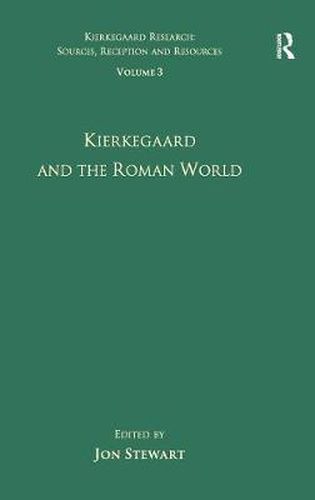Readings Newsletter
Become a Readings Member to make your shopping experience even easier.
Sign in or sign up for free!
You’re not far away from qualifying for FREE standard shipping within Australia
You’ve qualified for FREE standard shipping within Australia
The cart is loading…






While Kierkegaard’s use of the Greek authors, particularly Plato and Aristotle, has attracted considerable attention over the years, his use of the Roman authors has, by contrast, remained sadly neglected. This neglect is somewhat surprising given the fact that Kierkegaard was extremely well read in Latin from his early youth when he attended the Borgerdyd School in Copenhagen. Kierkegaard’s interest in the Roman authors is perhaps best evidenced by his book collection. In his private library he had a long list of Latin titles and Danish translations of the standard Roman authors in any number of different genres. His extensive and frequent use of writers such as Cicero, Horace, Terence, Seneca, Suetonius and Ovid clearly warrants placing them in the select group of his major sources.
The chapters in this volume demonstrate that Kierkegaard made use of the Roman sources in a number of different ways. His readings from the Borgerdyd school seem to have stuck with him as an adult. He constantly refers to Roman authors, such as Livy, Nepos, and Suetonius for colourful stories and anecdotes. In addition, he avails himself of pregnant sayings or formulations from the Roman authors, when appropriate. But his use of these authors is not merely as a rhetorical source. He is also profoundly interested in the Roman philosophy of Cicero, Seneca and Marcus Aurelius. Similarly, just as he is fascinated by Tacitus’ portrayal of the early Christians, so also he is amused by the humour of Terence and Apuleius. In short, the Roman authors serve to enrich any number of different aspects of Kierkegaard’s authorship with respect to both content and form.
$9.00 standard shipping within Australia
FREE standard shipping within Australia for orders over $100.00
Express & International shipping calculated at checkout
Stock availability can be subject to change without notice. We recommend calling the shop or contacting our online team to check availability of low stock items. Please see our Shopping Online page for more details.
While Kierkegaard’s use of the Greek authors, particularly Plato and Aristotle, has attracted considerable attention over the years, his use of the Roman authors has, by contrast, remained sadly neglected. This neglect is somewhat surprising given the fact that Kierkegaard was extremely well read in Latin from his early youth when he attended the Borgerdyd School in Copenhagen. Kierkegaard’s interest in the Roman authors is perhaps best evidenced by his book collection. In his private library he had a long list of Latin titles and Danish translations of the standard Roman authors in any number of different genres. His extensive and frequent use of writers such as Cicero, Horace, Terence, Seneca, Suetonius and Ovid clearly warrants placing them in the select group of his major sources.
The chapters in this volume demonstrate that Kierkegaard made use of the Roman sources in a number of different ways. His readings from the Borgerdyd school seem to have stuck with him as an adult. He constantly refers to Roman authors, such as Livy, Nepos, and Suetonius for colourful stories and anecdotes. In addition, he avails himself of pregnant sayings or formulations from the Roman authors, when appropriate. But his use of these authors is not merely as a rhetorical source. He is also profoundly interested in the Roman philosophy of Cicero, Seneca and Marcus Aurelius. Similarly, just as he is fascinated by Tacitus’ portrayal of the early Christians, so also he is amused by the humour of Terence and Apuleius. In short, the Roman authors serve to enrich any number of different aspects of Kierkegaard’s authorship with respect to both content and form.